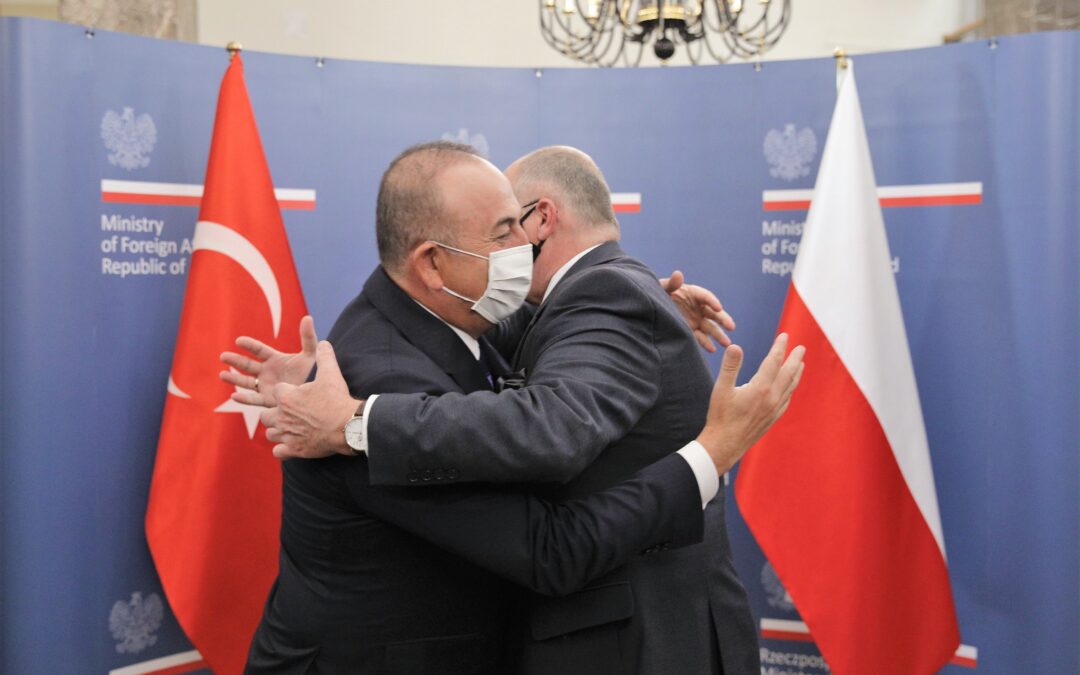Turkey has agreed to cooperate with Poland in tackling the migration crisis on the latter’s border with Belarus, which is also the eastern frontier of the European Union, where thousands of people from the Middle East, Africa and Asia have been attempting to cross in recent months.
The two countries’ foreign ministers, meeting in Warsaw this week, announced that their respective intelligence services will work together to identify threats and trafficking channels for migrants who are trying to enter the EU.
Thanked my friend FM @RauZbigniew of #Poland for his hospitality.
-Developing our relations in every field. Getting closer to $10 billion trade target.
-Will increase cooperation against irregular migration.
-Signed a cooperation agreement between our diplomacy academies.🇹🇷🇵🇱 pic.twitter.com/0rHi7UPJ9f— Mevlüt Çavuşoğlu (@MevlutCavusoglu) October 4, 2021
Poland’s Zbigniew Rau said that he had asked his Turkish counterpart, Mevlüt Çavuşoğlu, to “pay more attention” to migrants travelling by plane to Minsk, from where they often attempt to reach Poland. Such flights “most frequently use transfers in Istanbul”, said Rau, quoted by the Polish Press Agency (PAP).
Çavuşoğlu responded that in the past nine months Turkish airlines had transported 600 Iraqis to Minsk, around half of whom had subsequently returned.
Rau also announced that Çavuşoğlu had offered Turkey’s “comprehensive assistance”, which will mainly involve the “cooperation of intelligence services, sharing information, joint identification of places of threat and trafficking channels”.
Ankara will now invite Poland’s interior minister, Mariusz Kamiński, to visit for further consultations. “We are ready to undertake joint work on this problem, and also share our experiences – with both Poland and Lithuania,” said Çavuşoğlu. The latter country has also experienced a surge in crossings from Belarus.
Poland has been recording between 400 and 600 attempted crossings daily in the past weeks, according to data from the border guard. Warsaw, as well as the Baltic countries and the European Commission, have highlighted the Belarusian authorities’ role in facilitating the movements.
In response, Poland has constructed a razor-wire fence on the border and is now planning to build an “impenetrable” wall similar to the one found on the Greek-Turkish border. It has also placed the area under a state of emergency, which was recently extended until December.
As well as constructing its razor-wire fence, Poland has deployed 4,000 border guards and 25,000 soldiers to strengthen its frontier with Belarus. The state of emergency at the border has also been extended until the beginning of December.
Following his talks with Çavuşoğlu, Rau said that Turkey was Poland’s “most important economic partner in the Middle East”. Trade relations between the two countries were worth €6 billion last year, and the ministers expressed hopes that they would reach soon €8 billion.
The Turkish minister likewise hailed the fact that the two countries’ “strategic partnership was gaining depth” in terms of cooperation on “trade, the defence industry and irregular migration”.
Earlier this year, the two governments signed a $270 million deal for Poland to buy reconnaissance and assault unmanned aerial vehicles (UAVs) from Ankara, making it the first NATO member state to purchase Turkish drones.
During his visit to Poland, Çavuşoğlu also met with President Andrzej Duda to discuss cooperation in the fields of security and industry, reports TVN24.
The heads of Poland and Turkey’s foreign ministries signed an agreement on “cooperation between diplomatic academies” at their respective institutions with the “aim of improving the system of training diplomatic and consular staff”. The Turkish minister also spoke to Sejm speaker Elżbieta Witek and took part in the Warsaw Security Forum.
Main image credit: Dawid Zuchowicz / Agencja Gazeta

Maria Wilczek is deputy editor of Notes from Poland. She is a regular writer for The Times, The Economist and Al Jazeera English, and has also featured in Foreign Policy, Politico Europe, The Spectator and Gazeta Wyborcza.




















